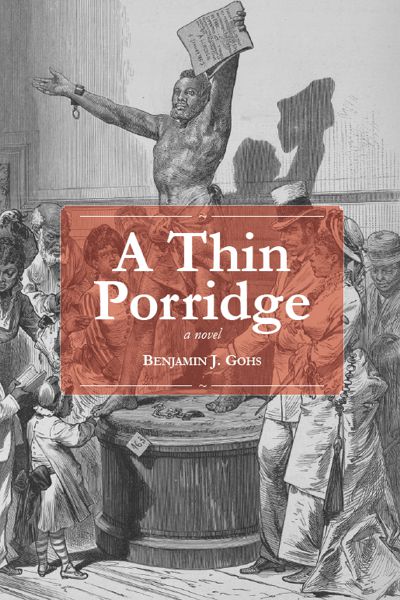
It was the year of The Pony Express, the walking skirt, and Henry’s repeating rifle. America was about to choose her most consequential president and lose one of her oldest states. The people of 1860 were on the verge of a life momentous.
So begins the journey of a lifetime for 19-year-old Abeona Browne, a young African-American woman of privilege and naivete who should be heading off to university but who instead embarks on a transatlantic search for answers to her father’s dark and terrible past.
Along the way, from Southern Michigan to New York City, down Western Africa way, to the Dark Continent’s southernmost tip, and up across the unforgiving veldt, Abeona meets a fabled slew of dramatis personae wrenched from the blood-soaked tobacco-smoked haze of history. The cast of A Thin Porridge is a motley mixture of ne’er-do-wells, kind-hearted rogues, rapacious thugs, opportunistic cowards, and genuinely good folk who’ve made some mistakes along the way.
But who are the faces behind the faces of this epic adventure story?
Well, firstly I must admit something that—as an author—I fear to speak aloud for how stupid it might sound. But the truth is … I’m not a visual writer. The people in A Thin Porridge came to me the way all well-seasoned characters arrive, they sidled up to the bar, took a stool, poured us each a stiff drink, and said, “Here I am. If you listen, I shall speak.”
Problem is, I can never see their faces. Not at first.
Through the darkened room I hear them—nervous throat clears and childish sighs, heavy whiskey breath and virginal gasps, click of sharp tongue and judgmental tsk. And the smells: breakfast cinnamon, rosewater perfume from grandmother hugs, gun powder between the fingers, dried blood—someone else’s blood—on the trouser, and the kind of spicy sweat that comes from the hard labor of dragging bodies down into cellars; and don’t forget the hardboiled egg going bad in a frockcoat pocket while the stomach sadly groans.
While none of my characters are clones of historical figures, I certainly drew on a number of prominent and lesser known real-life individuals to inform creation of bounty hunter Dubious Grimmis, heroine Abeona Browne, aging abolitionist Terrence Swifte, wise African factotum Djimon, defiant Fr. Benjamin Swerdlow, tenacious Sally Taft, and the venerable—and all-too-human slavery opponent Mr. Jon (Masozi) Browne.
Though his seemingly eponymous namesake—firebrand abolitionist John Brown—is merely a coincidence or perhaps an unconscious homage on the author’s part, the character Jon Browne more greatly resembles the honorable Frederick Douglass in his actions and spirit.
Well, some of which. But to divulge here would be to despoil.
The various women in A Thin Porridge, some slave and some free, were inspired by a number of historical figures in an attempt to recreate authentic speech, dress, behaviors, and attitudes of the time. Those real role models included Harriet Jacobs (Incidents in the Life of a Slave Girl), Karen Blixen (Out of Africa), Laura Ingalls Wilder (Little House in the Big Woods), Olive Schreiner (The Story of an African Farm), and Mary H. Kingsley (Travels in West Africa). Because, like Cormac McCarthy, I believe books are made from other books, I also borrowed flavors from characters in some works of fiction.
Abeona Browne, though never having lived a life in any respect similar to hers, has always reminded me of Celie in The Color Purple. Both are thoughtful, kind, quiet, and—initially—timid. Aside from Jon Browne’s obvious similarities with Douglass, Djimon is probably the character most influenced by a historical personage; that being Sengbe Pieh (later renamed Joseph Cinqué by his captors) of La Amistad fame. Though Djimon comes from the region now known as Cameroon, and Pieh was a Mende from the place now called Sierra Leone, both men hailed from West Africa. Both men were also one-time slaves who bravely endured captivity and who went on to find their freedom. But, the truth of the matter is, it was the actor who played Pieh in the movie Amistad who inspired the character Djimon. From the very first, when Mr. Swifte’s mysterious assistant appeared in A Thin Porridge, it was actor Djimon Hounsou’s voice I heard and his face I saw.
That’s right, Djimon is Djimon!
Another character who was heavily influence by real people was wicked newspaper editor J. Arthur Barnett. While Barnett’s in-person role in A Thin Porridge is a fairly brief one, the shadow he casts over the story is immense. Not only does the pro-slavery advocate write extensive editorials bashing Jon Browne and his cause but it’s his coin funding the bounty on this story’s McGuffin. Because the Barnett character is so central to the entire storyline, I did extensive research into the fire-eaters who so strongly opposed abolition. I also read many a pro-slavery editorial from real antebellum newspapers to get just the right tone and tenor. So, you could say, Barnett is a compilation of anti-abolition editors of the day.
Ultimately, while I strove to keep my “people” as realistic to the historical period as is possible from this far-flung future date, A Thin Porridge is not an encyclopedic entry, and neither is it a regurgitation of some true historical event. Rather, A Thin Porridge is a brand-new story with brand-new characters whose winks and nods, bonnets and boots might seem just a tad familiar to the savvy reader.
When 19-year-old Abeona Browne’s renowned abolitionist father Jon Browne dies in summer of 1860, devastating family secrets are revealed, and her life of privilege and naiveté in Southern Michigan becomes a frantic transatlantic search for answers—and someone she didn’t even know existed.
Still in mourning, Abeona sneaks aboard the ship carrying her father’s attorney Terrence Swifte and his assistant Djimon—a young man with his own secrets—on a quest to Africa to fulfil a dying wish. Along the journey, Abeona learns of her father’s tragic and terrible past through a collection of letters intended for someone he lost long ago.
Passage to the Dark Continent is fraught with wild beasts, raging storms, illness, and the bounty hunters who know Jon Browne’s diaries are filled with damning secrets which threaten the very anti-slavery movement he helped to build.
Can Abeona overcome antebellum attitudes and triumph over her own fears to right the wrongs in her famous family’s sordid past?
So named for an African proverb, A Thin Porridge is a Homeric tale of second chances, forgiveness, and adventure that whisks readers from the filth of tweendecks, to the treachery of Cameroons Town, across the beauty of Table Bay, and deep into the heart of the fynbos—where Boer miners continue the outlawed scourge of slavery.
Buy Links:
Amazon UK • Amazon US • Amazon CA • Amazon AU • Barnes and Noble
Meet Benjamin J. Gohs

Benjamin J. Gohs is a longtime award-winning news editor whose investigative journalism has included stories of murder, sex-crime, historical discovery, corruption, and clerical misconduct.
Benjamin now divides his time between writing literary thrillers and managing the community newspaper he co-founded in 2009.
Connect with Benjamin: Website • Twitter • Goodreads.
Thanks so much for hosting my book. This is by far my favorite interview-type piece I’ve done for the book tour thus far.
My pleasure! It was very interesting reading.